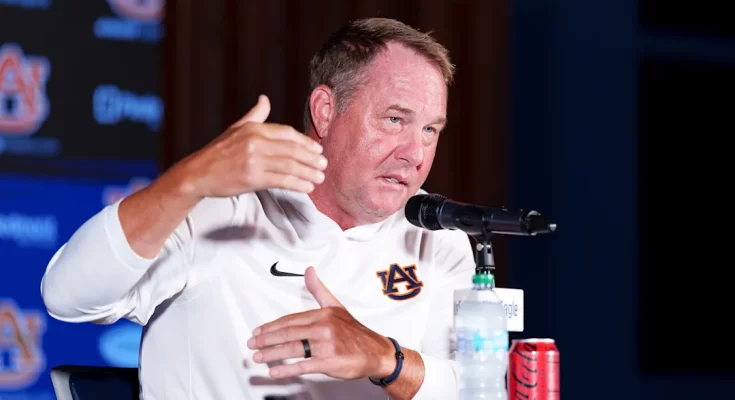The Auburn Tigers recently faced a moment of reflection after an off day practice session that left head coach Hugh Freeze visibly displeased with the team’s overall energy and intensity. In the highly competitive world of college football, maintaining a consistent level of focus and drive is paramount, especially for a program like Auburn that prides itself on resilience and determination. Freeze’s reaction to the team’s tepid energy after the off day sheds light not only on his expectations but also on the challenges the Tigers face as they strive to reclaim their stature in a demanding Southeastern Conference (SEC).
Coach Hugh Freeze, now in his second season with Auburn, has been vocal about his commitment to building a disciplined, mentally tough team. The off day, typically designed to give players a break and allow them to recharge physically and mentally, unexpectedly revealed a side of the team that concerned him deeply. The energy during the practice following this day was noticeably lacking the usual fire and urgency that Freeze demands from his players. According to sources close to the program, the practice lacked the intensity and sharpness that characterizes a team that is focused on achieving big goals.
This lack of enthusiasm did not sit well with Freeze, who is well aware that consistency in effort and mindset is what separates championship contenders from the rest. His disappointment is understandable given that Auburn is navigating a season filled with high expectations from fans, alumni, and the administration alike. The Tigers have been rebuilding under Freeze’s leadership, aiming to return to the upper echelons of college football. Any sign of complacency or loss of focus is a red flag that needs immediate correction.
Off days are traditionally seen as an opportunity for players to recover from the physical toll of intense practices and games. They are also critical for mental rest, allowing players to process film, study playbooks, and prepare themselves mentally for the challenges ahead. However, the subsequent practice is often a test of a team’s professionalism and dedication. Players are expected to return refreshed but also hungry and ready to push harder. For Auburn, the failure to meet these standards after an off day has highlighted potential gaps in the team’s internal motivation and leadership.
One possible reason for the subdued energy could be the cumulative fatigue from a tough schedule or the mental strain of trying to meet lofty goals. College football players juggle the demands of academics, athletics, and personal life, making consistency in performance a difficult task. Nevertheless, coaches like Freeze believe that elite programs require a culture where effort is non-negotiable, regardless of external pressures or internal distractions.
Leadership within the team plays a critical role in maintaining morale and intensity. Captains and veteran players are expected to set the tone during practices and games. If these leaders fail to inspire or hold their teammates accountable, the whole team can suffer. Freeze’s comments suggest that there might be a need for stronger leadership on the field and in the locker room. This is an aspect that Auburn’s coaching staff is likely addressing behind the scenes to ensure the team stays on track.
The SEC is notoriously unforgiving, and any lapse in focus can lead to costly losses. Auburn’s rivals are constantly improving, and the margin for error is slim. Freeze’s displeasure serves as a warning to the team that mediocrity is unacceptable and that every practice, every rep, and every day matters. The message is clear: rest is important, but it cannot come at the expense of preparedness and intensity.
Another angle to consider is the psychological impact of an off day and how different players respond to breaks in routine. Some athletes thrive on constant activity and may lose momentum during downtime, while others use the opportunity to recharge effectively. The coaching staff’s role is to manage these dynamics and tailor their approach to keep all players engaged and motivated. Freeze’s reaction may prompt adjustments in how the team handles off days and transitions back to practice.
The media and fan base have also taken note of the incident, sparking discussions about Auburn’s readiness for the remainder of the season. Critics question whether the Tigers have the mental toughness required to compete at the highest level, while supporters emphasize the importance of using such moments as learning experiences. Freeze’s candidness in addressing the issue publicly reflects a leadership style that prioritizes accountability and transparency.
Looking ahead, the key for Auburn will be how the team responds to this setback. Coaches often use moments of disappointment as catalysts for growth and renewed focus. The Tigers have the talent and potential to rise above the tepid energy displayed after the off day, but it will require a collective commitment to the standards set by Freeze and his staff.
The role of the coaching staff in reinforcing expectations and fostering a culture of accountability cannot be overstated. Beyond physical preparation, mental conditioning and team-building exercises may be employed to strengthen the players’ resolve. Freeze’s emphasis on energy and intensity is not merely about effort; it’s about embodying a competitive mindset that can carry the team through adversity.
Ultimately, the success of the Auburn Tigers this season hinges on their ability to consistently bring their best selves to every practice and game. Coach Hugh Freeze’s dissatisfaction with the recent drop in energy serves as a pivotal reminder that the journey to excellence is fraught with challenges that test character and resolve. The Tigers must heed this message and recommit to a culture of relentless focus if they hope to achieve their goals.
In conclusion, the off day incident and the ensuing reaction from Hugh Freeze underscore the delicate balance between rest and readiness in college football. For Auburn, it is a wake-up call to elevate their mental and physical game consistently. The Tigers have the foundation to build a successful program under Freeze’s leadership, but it will require unwavering dedication, strong leadership, and an unyielding competitive spirit to turn moments of disappointment into stepping stones for greatness.



